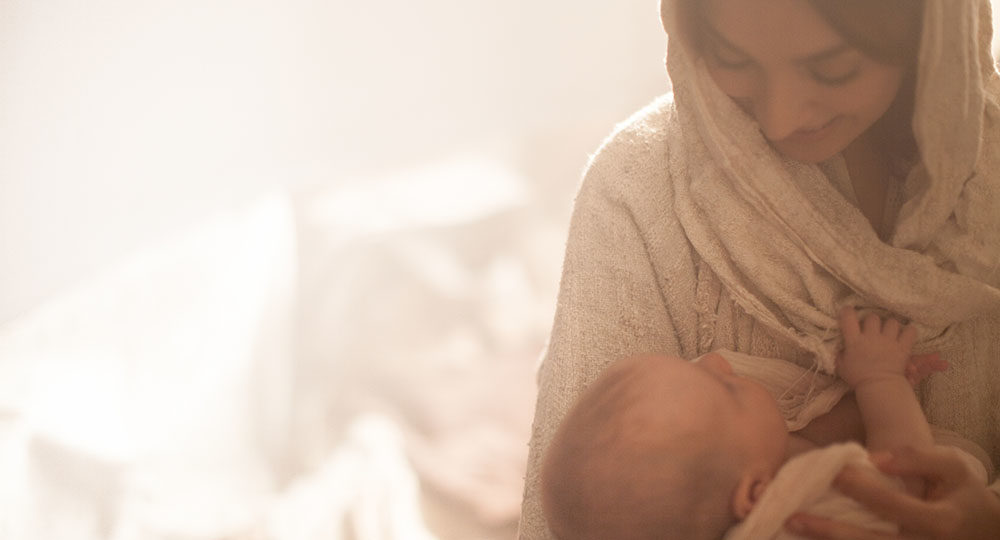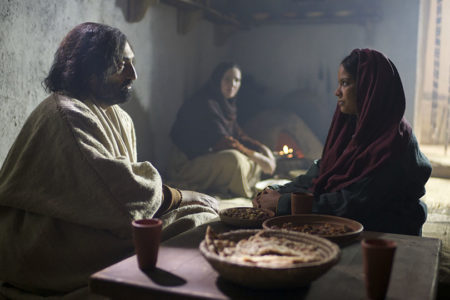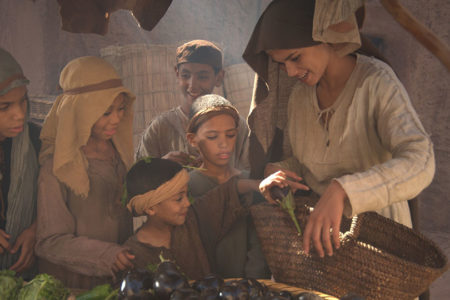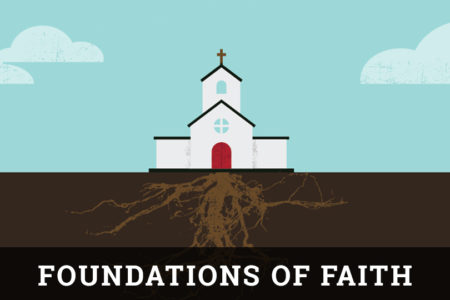The Woman’s Relationship to Her Home and Family
I have never been one to scrupulously follow a recipe. A pinch of substitution here, a dash of elimination there—it all suits me fine as long as it turns out edible. Sometimes, though, I am unwittingly thrust into the world of culinary peculiarity, as I was in the incident of the french toast.
My youngest was an infant when I ran out of milk while preparing breakfast. How bad could it be? I reasoned, as I swished the contents of a can of infant formula into some eggs, fried up a batch of french toast, and set it before my husband.
He barely tasted it before he demanded to know, “What did you put in this? It tastes terrible!”
“I used the baby’s formula,” I said. He was not pleased.
“Well, I figured, How bad could it be? Milk is milk, right?”
“How bad could it be! It’s pretty bad!” he laughed, his sense of humor returning. “You know,” he mused, “according to the Talmud, a Jewish man could actually divorce his wife for this.”
And you know, he was right.
According to the Talmud, the authoritative library of ancient rabbinic interpretation of the law of Moses, a man could divorce his wife if she “spoiled his cooking,” if she talked so loudly that the neighbors could hear her, or even if he simply found someone he thought was prettier than she.*
Although the Talmud was not codified until the third century A.D., it reflects the common attitude toward women in ancient Israel. The average Jewish woman in Bible times devoted her entire life to serving her family and derived her status and respect almost exclusively from her role as a mother—particularly the mother of sons.
She addressed her husband as “lord” or “master.” She walked; he rode. When they both walked, she trailed behind him. She was listed as his property with everything else he owned.* Her husband was the absolute ruler of his family. He had the right to send her away with no explanation, but she could never leave him. He could sell his daughters into slavery and order disobedient children put to death.* Her place was subservient to that of her husband to the degree that Israelite men later were taught to thank God every day “that He has not made me a woman.”*
“By the strict letter of the law, the status of the Israelite woman could hardly have been worse,” writes E. W. Heaton. “She could not leave her husband because he owned her as he owned his sheep and goats.”* Life, however, was generally more humane than the strict letter of the law, says Heaton, and the woman’s lot was rarely as bad as it could have been.* Elkanah, for example, truly cherished his wife, and when Hannah lamented her barrenness, he asked her, “Am not I better to thee than ten sons?” (1 Sam. 1:8). He must have been good to her indeed, because ten sons would have constituted an enormous blessing.
Jewish women usually received affection, respect, and privileges based upon their position as the mother of the sons of the house. After Boaz purchased Ruth to be his wife, the elders and all the people in the gate blessed him by saying that they hoped the Lord would make Ruth fruitful like Rachel and Leah, who built the house of Israel because of the sons they bore (Ruth 4:11). Only sons remained with the family and increased its wealth. Only sons inherited property and provided for their elderly parents. Widows were often reduced to begging if they had no sons to care for them.
Although sons were preferred, girls were not shunned. Israelite girls, in fact, appear to have fared better than some of their pagan contemporaries. In ancient Greece during the time of Aristotle, women were held in such contempt that newborn girls were regularly abandoned on mountaintops to die of exposure. Aristotle himself, considered an “enlightened thinker” of the fourth century B.C., called women a necessary “deformity” required by nature to perpetuate the race.* In some cultures, women were often regarded as nothing more than domestic animals to be punished by starvation for disobedience and mutilated as a sign of servitude.*
Such was not the thinking in Israel. So important was motherhood that a woman grew considerably in status as she perpetuated the family line, and her position was literally saved through childbirth. A barren woman was considered disgraced and cursed by God, and the rabbis ascribed to her a place among the dead.*
Considering all the work the women did, mothers must have rejoiced privately when they gave birth to girls. It was the woman who cleaned the house (usually one room, which was often shared with animals), hauled the water, milled the grain, prepared the food, and sewed the clothes. It is not surprising that the woman in Proverbs 31 “riseth also while it is yet night” (v. 15), and that “her lamp goeth not out by night” (v. 18). These women did it all well—and did it all willingly. And they certainly had a lot to do.
Linen garments began with the flax in the field, and wool clothing with the wool on the sheep’s back. First the women harvested the flax in late March and early April by cutting it at ground level or, if necessary, pulling it up by the roots. Then they beat the stalks with sticks to shake free the seed pods and laid the flax out to dry in the sun. Rahab hid the two Israelites who came to spy out Jericho under the flax she was drying on her roof (Josh. 2:6).
The flax was then steeped in water for a week, separating the inner fibers from the woody part of the plant, dried, beaten again, combed, spun, and woven into a garment.* Wool had to be cleaned, carded, spun, and then woven.
Most Hebrew women used a hand spindle as easily as today’s women use knitting needles—or a computer mouse.* Some were so proficient at doing all of this and were able to decorate the garments so attractively that they sold them for profit. Because of the time involved in making them, from plant to garment, clothes were extremely costly and were considered very valuable. Poor people often owned only the clothing on their backs. This held true even in New Testament times. The widows who were mourning the death of the seamstress Dorcas, whom Peter raised from the dead (Acts 9:40), were extolling her great acts of charity when they showed Peter the tunics she had made for them, evidently for free.
To launder these heavy clothes, the women carried the garments to a swift current or stream and let the water run through them, or they placed the wet clothes on flat stones and pounded out the dirt.* Whatever soap they used they made themselves.
Baking and cooking were no less of an ordeal. Bread was so basic a food that it was eaten at each meal and symbolized life itself. Wheat was preferred, but barley was less expensive. Every day grain had to be ground into flour. In early Bible times, the women used a saddle quern. This was a backbreaking method of crushing grain between two stones by pushing the upper stone back and forth over the lower stone while on one’s hands and knees. The invention of the hand mill allowed women to sit while crushing grain between two disc-shaped stones. The top stone had a wooden handle through it so that it could be rotated against the lower stone, thus milling the grain into flour. This system probably continued to be used in the countryside, but by Jeremiah’s time some of the cities evidently had bakeries, because King Zedekiah commanded that the imprisoned prophet be given a piece of bread daily “out of the bakers’ street” (Jer. 37:21).
The main meal of the day was eaten at sunset and took most of the day to prepare. The women kept the fire burning; baked the bread; milked the goats and sheep; made cheeses; gathered, cleaned, and cooked the vegetables; and, on special occasions, stewed meat.
The birth of a child barely interrupted the work detail. The average Israelite mother nursed her children for two to three years while running her household and caring for the younger children whom she also trained. Once a son reached three years of age, he was placed under his father’s tutelage. In latter Bible times, he was also taught the Torah (the Pentateuch, in which is contained the Jewish law), while such an education was strictly forbidden for women. As one ancient rabbi put it, “A woman has no learning except in the use of the spindle.”* The Talmud actually condemns a father who dares to teach the Word of God to his daughters: “Whoever teaches his daughter Torah is as though he taught her obscenity,” and “Let the words of Torah rather be destroyed by fire than imparted to women.”*
Not surprisingly, girls stayed in their mother’s care and were taught only the things necessary to make them good wives when they were old enough to marry—at age twelve and a half. According to the Talmud, a “good” wife was the only kind worth keeping. What constituted a good wife? Someone who relieved her husband of all domestic toil and trouble and sometimes even tended to his business affairs so that he could devote himself to the study of the Torah.* A bad wife, says the Talmud, “is like leprosy to her husband. What is the remedy? Let him divorce her and be cured of his leprosy.”* Another rabbi goes so far as to say that it is a man’s “religious duty” to divorce a bad wife.*
In many areas, of course, God’s law and the Jewish law part company. Israelite men apparently thought less of women than did the Almighty, particularly widows, who were often ignored or exploited and left to starve. The prophets constantly rebuked the Israelites for their lack of justice and mercy in this regard. In such a male-dominated society, it must have been somewhat insulting to men that God sometimes chose to speak through the mouths of women.
Deborah was called by God to be a judge and prophetess in Israel. Evidently no man was fit to do the job, so God gave it to a woman, and Deborah forever holds a place of honor in Jewish history as the “mother in Israel” who Barak insisted accompany him into battle (Jud. 4:8).
When Hilkiah the priest found the book of the law in the house of the Lord, he and several others whom King Josiah had appointed went to Huldah, a prophetess and contemporary of Jeremiah, to inquire of the Lord. Perhaps as a testimony to the extreme degree of spiritual decline in the country, the Lord spoke through a woman concerning the impending doom of the southern kingdom (2 Chr. 34:22–28).
Although prophetesses are mentioned in the Bible, they obviously were few and far between. The average Jewish woman served her family alone, and this job was her first priority. No woman in Bible times would have dared to set anything inferior before her husband for breakfast. Of course, she would not have run out of milk either. She would have simply milked a goat.








